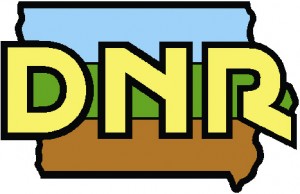
DES MOINES – REAP funding safeguards Iowa’s future through conservation education. Floyd County’s Fossil and Prairie Preserve Center and the Lost Island Nature Center in Palo Alto County demonstrate the success of statewide REAP-empowered education efforts. Quality of life for all Iowans is bolstered by recreational opportunities that double as resource conserving activities — allowing future generations to enjoy the same outside wonders.
A steady stream of school busses shuttle field-trippers to the Devonian fossil beds of Northeast Iowa’s Rockford Fossil and Prairie Reserve Center that hold a variety of 365 million-year-old fossils. Kids bring egg cartons outfitted with glued-on classification-enabling charts that aid in organization of the many treasures they will surely collect.
The field day begins in the prairie-remnant surrounded $200,000 REAP-funded Fossil Center that opened in 2001. There exhibits help educate students on all parts of the park including fossil, geology, oceanic history, Iowa’s prairie history, backyard nature, and Winnebago River history. The Winnebago River is the northern border of the 402-acre natural prairie and fossil preserve.
Then the energy-frothed youth get to go as wild as their particular chaperones will allow while exploring a landscape of loose rock hills and cliffs that create the perfect, safe environment for kids to challenge themselves while collecting brachiopods, gastropods, coronoids (still alive in today’s oceans), colony corals, horned corals and clams.
The Rockford quarry was originally dug by the Rockford Brick and Tile Company, which discarded fossils due to their disruptive properties of the kiln hardening process. They were after the blue clay beneath the limestone fossil layer, which, because of its insulator properties, was the impetus for talks of turning the quarry into a landfill. A grass roots letter-petitioning process and REAP funding helped actualize what is now enjoyed by more than 5,000 annually as a park, where fossils can still be found embedded in the walls of many cuts and washes throughout the quarry.
“As the Naturalist, environmental education is my number one goal — to get people connected with the outdoor environment so they’ll want to go out and enjoy it. It’s really important in my mind, especially now when we’re plugged in so much with technology; just to be able to go out and take a hike is very important,” said Floyd County naturalist Heidi Reams.
She said the fossil park is a great place for grandparents to share with their grandkids, who can wear off quite a little energy exploring and learning.
“I had my 80+ year-old Grandma out here once and she was able to find one. If you can get down to the ground and identify shapes, you are set. You don’t even need tools — they’re just there for the taking,” Reams said.
Restored prairie and trails that connect all the way into Rockford also provide great recreational fun.
“To me, the memory of the these kids’ experience is the most important part,” said Reams, who hopes that those memories will lead to new experiences for future generations.
In northwest Iowa, a REAP grant of $197,897 funded construction of the Lost Island Nature Center in 1992. Located in the Prairie Pothole Region adjacent to 7,000 acres of public land, in the 75-acre Lost Island-Huston Park in Palo Alto County, public programs and demand increases led to a 2005 classroom addition to the Center — paid for by an additional $136,970 REAP grant.
Located on Lost Island Lake and open to the public free of charge, the Lost Island Nature Center’s primary goal is education for all ages, especially students, and features exhibits that include a wetland diorama, raptor and watershed displays, an archaeology display, indoor beehive, an aquarium with native fish, library and a classroom.
In addition to the K-6 distributed Cattails newsletter, a wide array of free public programs is offered throughout the year. Summer Explorers Day Camp and Junior Nationalists serve as special youth programs.
“Palo Alto Co. Naturalist Miriam Patton constantly shares her enthusiasm for nature, providing programs and outdoor activities for school children, scouts, 4-H civic groups and the general public,” said County Conservation Board director Mary Barrick.
“REAP played a huge role in the success of Palo Alto County Conservation Board education programs. We are proud that the Lost Island Nature Center was the first building funded by REAP. Field trips, bus tours, canoeing, cross country skiing, fishing derby, prairie hikes and annual events such as the Wings and Wetlands Event, Birdhouse Building Workshop, Halloween Hike, Saturday In The Park all evolve around the Nature Center,” Barrick said. “The Nature Center provides a place for people to come and experience nature first hand and has become the focal point for environmental education in Palo Alto County.
“We believe that the conservation of our natural resources tomorrow depends upon the education of our citizens today.”
In its 25 years, REAP has benefited every county in Iowa by supporting 14,535 projects. REAP has funded these projects with $264 million in state investments, leveraging two to three times the amount in private, local and federal dollars. Collectively, these projects have improved the quality of life for all Iowans with better soil and water quality; added outdoor recreation opportunities; sustained economic development; enhanced knowledge and understanding of our ecological and environmental assets, and preservation of our cultural and historic treasures.






